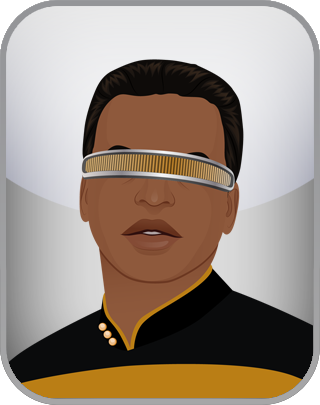Star Trek: TNG Knowledge Test
How much do you know about The Next Generation?
Engage your warp cores and prepare to embark on a journey through the stars. This quiz will challenge your knowledge of TNG's captivating plotlines, advanced technology, and thought-provoking themes. Whether you're a seasoned Starfleet officer or a curious cadet, get ready to engage your mind and boldly go where no quiz-taker has gone before as you navigate this TNG knowledge quiz.
To test your knowledge, answer each of the following questions below.
Question 1 of 21
What is the name of the android officer on the USS Enterprise-D?
NEXT
The IDRlabs Star Trek: TNG Test was created by IDRlabs.
"Star Trek: The Next Generation" made its debut on television in 1987, continuing the legacy of the original "Star Trek" series created by Gene Roddenberry in the 1960s. This critically acclaimed show, set in the 24th century, captivated audiences worldwide with its exploration of space, diplomacy, and moral dilemmas faced by the crew of the USS Enterprise-D. Over its seven-season run, TNG left an indelible mark on popular culture and has had a lasting impact on science fiction and beyond.
One of the most significant cultural impacts of TNG was its diverse and inclusive cast, reflecting a vision of a future where humanity had transcended racial and gender barriers. Led by the stoic and principled Captain Jean-Luc Picard, portrayed by Sir Patrick Stewart, the crew featured a wide array of characters from different species and backgrounds. Lieutenant Commander Geordi La Forge, played by LeVar Burton, showcased a positive representation of a blind character, highlighting abilities rather than disabilities. The empathic ship's counselor, Deanna Troi (Marina Sirtis), exemplified the show's commitment to celebrating multiculturalism.
TNG also explored progressive social issues such as gender equality, LGBTQ+ rights, and the ethics of artificial intelligence. The character Data, an android striving to understand humanity, provided a platform to discuss questions about sentience and what it means to be human. Episodes like "The Outcast" and "The Offspring" tackled themes of gender identity and the complexities of love, prompting important conversations in real-world society.
Moreover, TNG's influence on technology and science cannot be underestimated. The show introduced futuristic concepts like communicators (similar to modern smartphones), replicators (3D printing), and voice-activated computers, which have since become part of the collective imagination and have even inspired real-world innovations. Engineers and scientists have credited the series with inspiring them to pursue careers in technology and space exploration.
Star Trek has also been a cultural touchstone for the science fiction community and has influenced generations of writers, filmmakers, and creators. The show's emphasis on optimistic visions of the future and peaceful exploration laid the groundwork for other successful sci-fi franchises, proving that science fiction could serve as a platform for meaningful and thought-provoking storytelling. TNG's impact extended beyond the small screen, inspiring a series of successful movies and spin-offs like "Star Trek: Deep Space Nine," "Star Trek: Voyager," and "Star Trek: Enterprise."
Additionally, TNG's fanbase has been instrumental in shaping modern fan culture and conventions. Trekkies, as they are affectionately called, have fostered a sense of community and dedication by organizing events and keeping the franchise alive through fan fiction, fan art, and fan films. The fervent support from the fanbase has been integral to the enduring success of Star Trek and its continued relevance in popular culture.
"Star Trek: The Next Generation" has left an enduring cultural impact on multiple fronts. From its portrayal of diversity and inclusivity to its exploration of ethical dilemmas and scientific concepts, the show has shaped the way audiences view the future and inspired generations of fans, creators, and innovators. With its timeless messages of hope, unity, and exploration, TNG's legacy continues to resonate in both the realm of science fiction and the broader cultural landscape. As the show's iconic intro suggests, TNG's cultural impact is a testament to its mission to boldly go where no one has gone before.
For more information about our online tests and quizzes, consult our Terms of Service.

